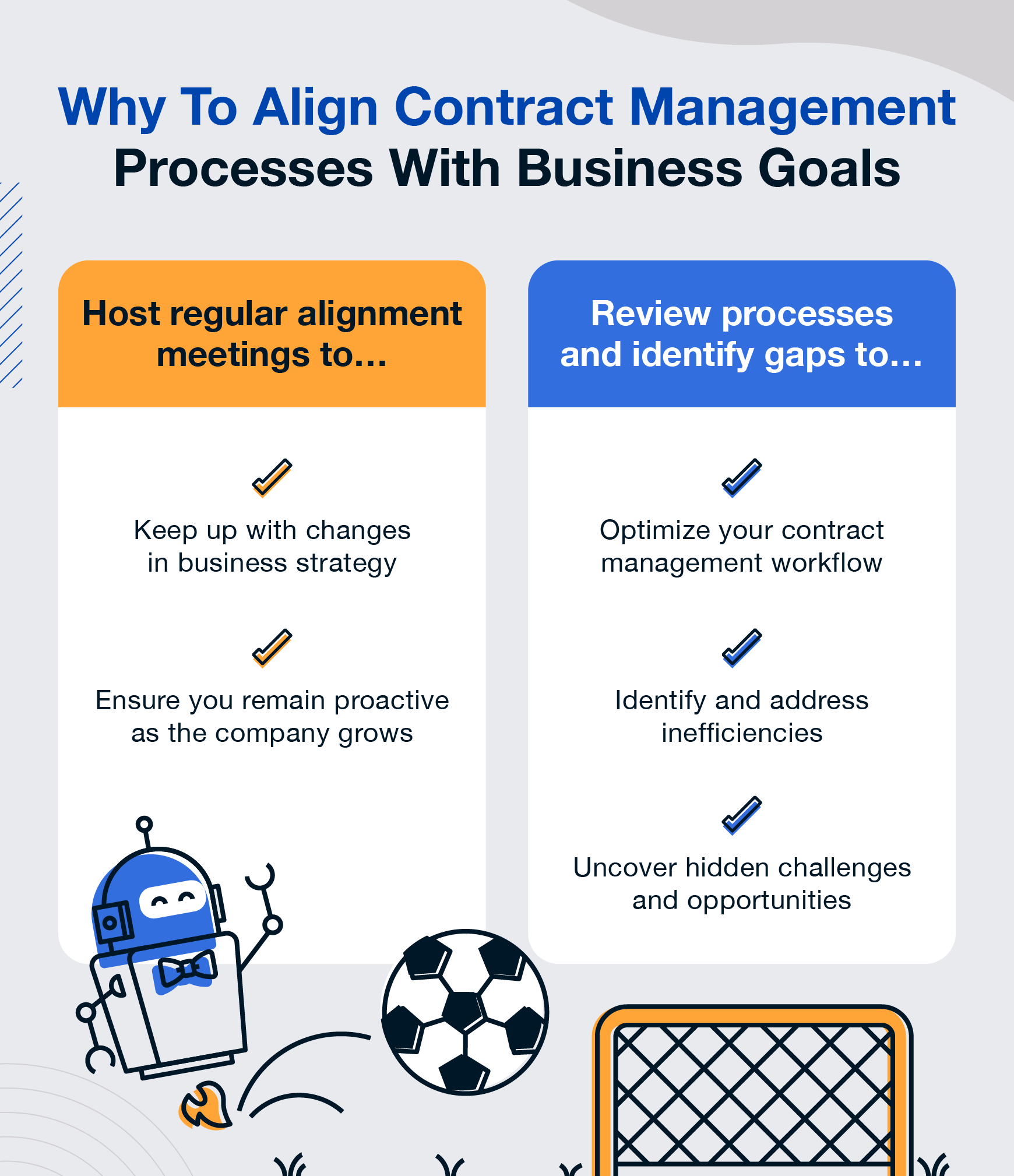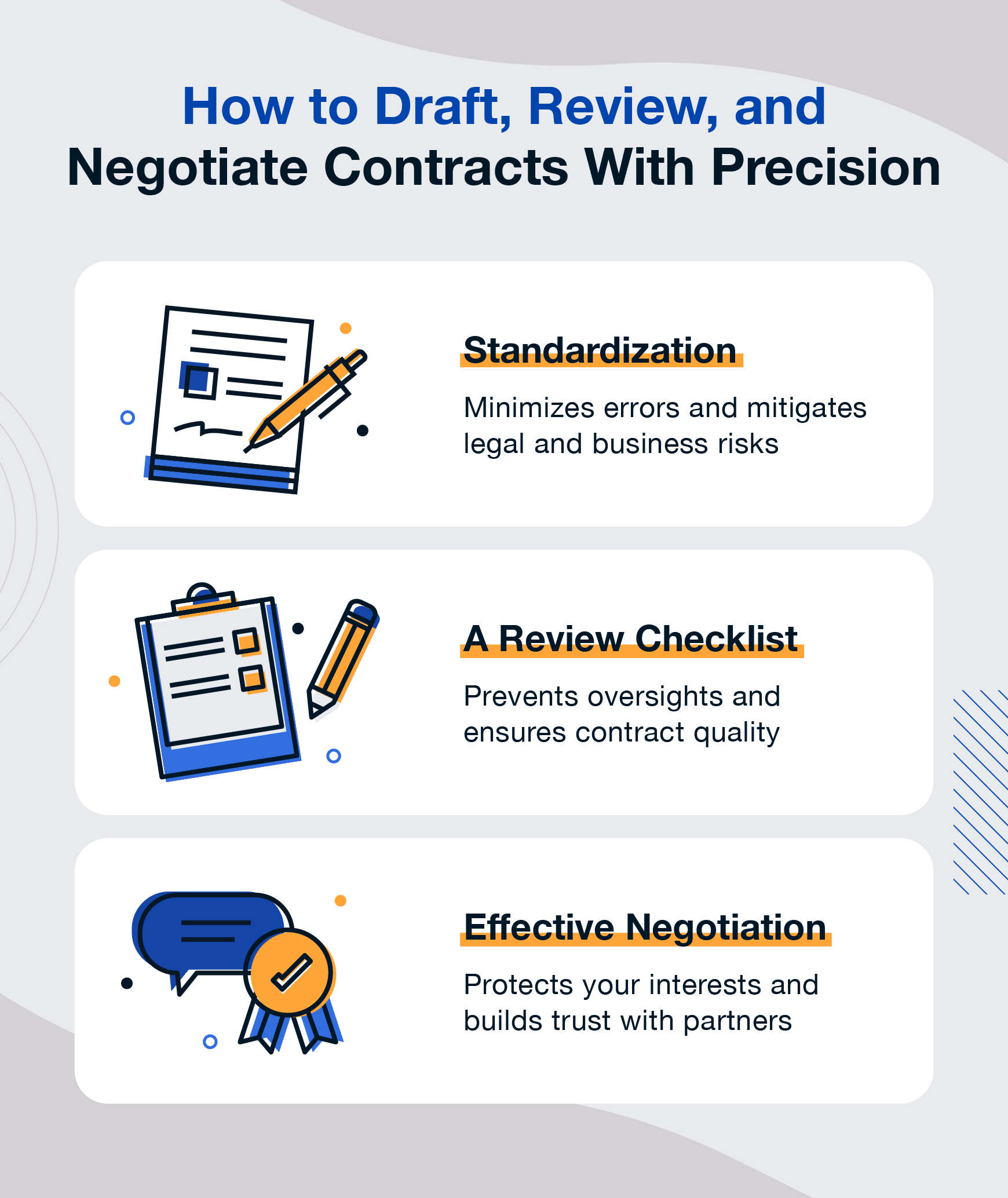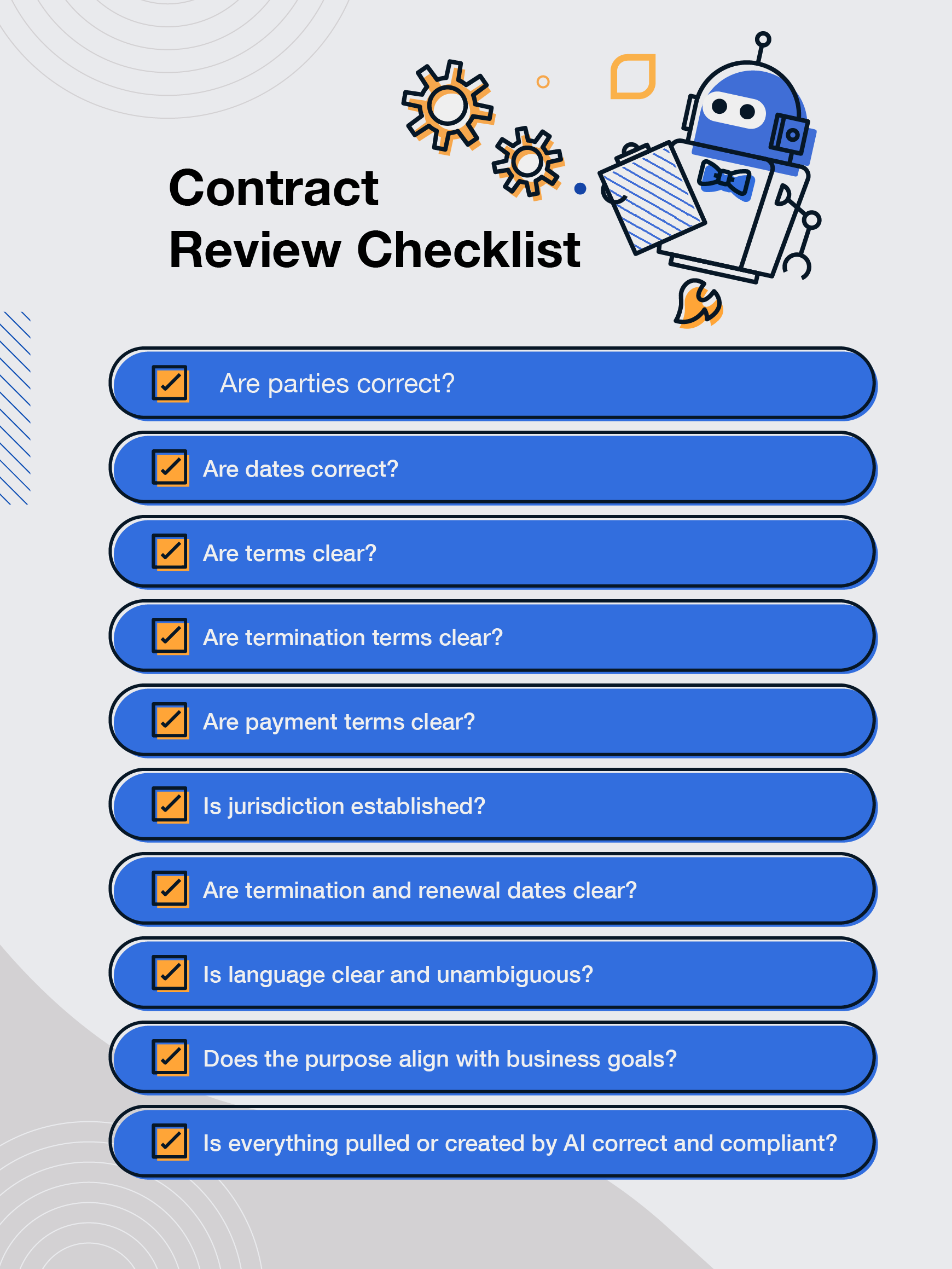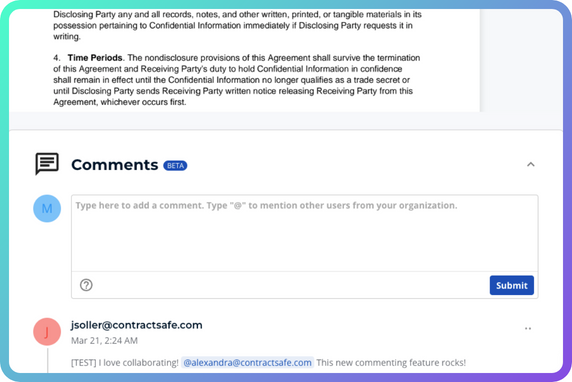When it comes to contracts, in-house counsel has seen it all, from the "simple" contracts that turn into epic novels to the urgent deals that needed to be signed yesterday.
You're the unsung hero in this legal labyrinth, navigating through clauses and compliance while trying to align the stars — or at least the business’s goals — with every agreement.
It's a juggling act that requires precision, foresight, and, let's be honest, a bit of patience. But what if there was a way to transform this chaos into clarity?
In this guide, we'll walk through contract management for in-house counsel. From aligning processes with business objectives to leveraging technology that cuts through the tedium, we're here to show you how to make contract management less about crossing t's and dotting i's and more about creating an adaptable strategic edge that takes your business to the next level.
Table of Contents
Align Contract Management Processes with Business Goals
Develop and Implement Scalable and Repeatable Contract Management Workflows
Break Down Communication Silos Between Teams
Draft, Review, and Negotiate Contracts With Precision
Use ContractSafe for Contract Management
Give Your Legal Team the Tools They Need to Get to the Next Level
TL;DR
- Aligning contract management with business goals transforms a routine task into a strategic asset, paving the way for growth and streamlined operations.
- Mastering the art of risk management and compliance ensures the organization's safety net is always in place, making complex legal landscapes navigable and secure.
- Contract management software not only simplifies tedious tasks but also unlocks new efficiencies, allowing in-house counsel to focus on what truly matters.
1. Align Contract Management Processes With Business Goals
Effective contract management should work hand in hand with your company’s goals, bridging legal requirements and strategic ambitions. This means every contract you deal with should drive your business forward.

Host Regular Alignment Meetings
Business goals can change quickly. To keep up, in-house counsel should regularly meet with leadership from the finance, sales and marketing, operations, IT, and compliance teams.
These discussions are your opportunity to:
- Stay informed: Keep up with changes in business strategy, explore new market opportunities, and understand operational shifts that could affect the organization and its contract portfolio. This awareness supports informed legal guidance across all areas of the business.
- Maintain relevance: These meetings will help you understand how shifts in the business landscape could impact many legal domains, including regulations, intellectual property rights, and employment law, ensuring a comprehensive legal strategy.
- Anticipate needs: By becoming a strategic partner to the business, in-house counsel can anticipate legal needs and challenges before they arise, offering solutions that align with the company’s strategic direction and operational needs.
Make these meetings a standard part of your schedule. They’re crucial for ensuring your legal strategies support the business effectively and that you can anticipate needs rather than just respond to them.
Review Processes and Identify Gaps
Consistently reviewing your existing contracts and the processes you use to manage them is vital. But it’s not just about looking for legal inconsistencies; it’s also about ensuring these contracts serve the broader needs of your organization.
- Find and fix discrepancies: Regularly check if the terms of your contracts are still in line with your company’s goals. This could relate to financial terms, service expectations, or compliance standards that need updating.
- Optimize processes: Look at how contracts are managed, from creation to storage, and identify inefficiencies. Are there delays in getting contracts approved? Is finding and retrieving contracts more complicated than it needs to be? Can anything be automated?
- Establish a feedback loop: Create mechanisms for regular feedback from stakeholders involved in or affected by contracts. This could be through surveys, direct interviews, or participation in review meetings. Feedback can uncover hidden challenges and opportunities for improvement in contract management.
Aligning your contract management processes with your business goals in this way ensures contracts are strategic tools that contribute to your organization’s success.
Track Key Performance Indicators (KPIs) for Strategic Alignment
Effective contract management aligns closely with business metrics through careful monitoring of KPIs. These KPIs offer insights into the performance and strategic impact of contracts, like:
- Contract cycle time: Shorten from initiation to approval for efficiency.
- Compliance rates: Ensure adherence to policies and regulations.
- Renewal rates: High rates indicate value and satisfaction.
- Financial impact: Measure savings and cost avoidance from negotiations.
- Vendor performance: Assess contributions to business objectives.
- Dispute frequency: Lower disputes signify clearer, fairer contracts.
- Stakeholder satisfaction: Aim for high satisfaction in processes and outcomes.
Tracking these KPIs enables in-house counsel to optimize contract processes, ensuring they drive business goals and contribute to the company's success with minimal wording and maximum impact.
2. Develop and Implement Scalable and Repeatable Contract Management Workflows
Many legal professionals say they’re overwhelmed with administrative tasks and that there’s simply too much work for one person to tackle.

But with an organized, systematic approach to contract management, you can focus on big-picture ideas and legal strategy.
That’s why crafting a workflow that's both scalable and repeatable is essential for your organization's efficiency and growth.
Here's how you can create workflows for each stage of the contract management lifecycle.
- Contract creation: Begin with establishing standardized templates for various contract types. This foundation ensures consistency across all contracts and streamlines the creation process.
- Negotiation and collaboration: Build a process for managing contract changes. Ensuring every change is tracked and maintaining strict version control is pivotal in keeping negotiations transparent and efficient.
- Review and approval: The review and approval stage requires a meticulous approach. Implementing a workflow that routes contracts to the relevant decision-makers can reduce wait times and prevent bottlenecks.
- Administration and execution: Leveraging digital signature technology can expedite the contract execution process while ensuring security and compliance. Storing executed contracts in a centralized, organized manner allows for easy access and management.
- Ongoing management and renewal: Set up a process for managing contracts post-execution so you can monitor key dates and obligations. Automated reminders for performance reviews, renewals, and expiration dates ensure no critical milestones are overlooked.
- Reporting and tracking: Finally, a comprehensive approach to reporting and tracking contract performance is crucial. Having a system to monitor contract statuses, compliance, and analytics can help you make informed decisions.
With a structured approach to your contract management workflow, you can make sure each contract meets legal standards and contributes to the strategic and operational efficiency of your organization.
3. Train and Empower Staff
Not everyone who deals with contracts is a legal expert, but their decisions and actions can have significant implications.
That’s why it’s in the legal team’s best interest to ensure all staff members who interact with contracts receive adequate training.
This education empowers them to handle contracts confidently, efficiently, and with a clear understanding of the potential risks involved.
Broadening the Training Scope
Contracts touch a lot of hands, and given how impactful contract decisions and actions can be, it’s important that everyone who touches a contract has a decent understanding of how they work.
This includes:
- Procurement professionals: These team members are often on the front lines in contract management, negotiating terms with vendors and suppliers. This means that they need a strong understanding of contract law to protect the company's interests and ensure favorable terms.
- Human resources: HR pros deal with contracts related to employment, including job offers, consultancy agreements, and severance packages. Their decisions can significantly impact the organization's legal standing and employee relations.
- Sales: Sales staff are often the ones handing over agreements to customers and clients. They should be aware of how the agreements work in order to accurately explain them to clients while adhering to company policies and legal requirements.
- IT: Software has become the backbone of many business operations, and IT team members are often the ones dealing with all of the contracts relating to software licensing, service level agreements, and data protection. They need to understand the ins and outs of these contracts in order to safeguard the company’s tech assets and ensure its compliance with regulations.
- Project managers: There are many obligations outlined in contracts, from delivery to budget allocation and collaboration guidelines. A firm grasp on basic contract management principles can help project managers ensure everything goes smoothly.
By recognizing and addressing the training needs of your entire ecosystem of personnel interacting with contracts, your organization can mitigate risks, enhance compliance, and empower your teams to contribute more effectively to business objectives.
Host Engaging and Accessible Training Sessions
The goal here is to make learning about contract management as engaging and accessible as possible. Diverse formats cater to different learning styles and schedules, making the information more digestible and easier to apply in real-world scenarios.Consider introducing some of these formats:
- Workshops: Encourage attendees to ask questions and participate in role-playing scenarios that simulate negotiation and problem-solving situations they might face in their specific roles.
- E-learning modules: Create quick online courses that staff can access at their convenience. These modules should cover a wide range of topics, from contract law fundamentals to the specific procedures and challenges of your company’s contract management system.
- Quick reference guides: Prepare concise, easy-to-understand guides that staff can quickly refer to. These guides should highlight the essential aspects of your contract management process, key legal terminology, and tips for avoiding common mistakes.
- Lunch and learns: Arrange casual lunchtime sessions where team members can gather to discuss contract-related topics in a relaxed setting. Consider featuring guest speakers, case studies, or open discussions on relevant subjects.
Did you know that ContractSafe offers specialized user training sessions designed to enhance team proficiency in contract management tools and practices? These sessions are tailored to ensure users can fully leverage ContractSafe’s features, facilitating a smoother, more efficient contract management process.
Clarify Processes and Expectations
Clear processes and set expectations are crucial for effective contract management. This involves:
- Defining roles and responsibilities: Clearly outline who is responsible for each stage of the contract lifecycle to avoid confusion and ensure accountability.
- Establishing standard operating procedures: Develop standardized processes for contract review, approval, and management, making it easier for staff to follow and maintain consistency.
- Communicating objectives: Ensure all team members understand the strategic importance of contracts and how they contribute to the organization's goals.
- Providing resources and tools: Equip staff with the necessary tools and access to information, enabling them to manage contracts effectively and make informed decisions.
Investing in training and clearly defining processes and expectations can help organizations minimize risks and cultivate a culture of compliance and awareness, allowing legal counsel to concentrate on strategic initiatives.
4. Break Down Communication Silos Between Teams
Just like a game of telephone, vital information can become distorted as it passes through multiple hands. In contract management, this can lead to misunderstandings, missed opportunities, and even compliance risks.
For in-house counsel, ensuring clear and open communication across all departments and external stakeholders is critical to maintaining the integrity and value of contracts.
To avoid the pitfalls of miscommunication, establish a digital contract repository where all contract-related information is easily accessible.
You’ll want a system that offers secure access and controlled permissions, ideally with no user limits (like ContractSafe!) This ensures everyone in the organization who needs access to specific documents can access them without compromising security.
Another important feature to keep an eye out for is customizable dashboards. This will allow each team member to view the most relevant and critical information at a glance, tailored to their specific needs and roles within the organization.
5. Draft, Review, and Negotiate Contracts With Precision
Crafting, scrutinizing, and negotiating contracts with precision ensures that every agreement aligns perfectly with your organization's goals while minimizing legal risks and misunderstandings.
To achieve this, adopt a systematic approach that incorporates the following strategies:

Standardize Contract Creation
Standardization minimizes errors, speeds up the drafting process, and ensures all contracts adhere to your legal and business standards. It helps create a reliable foundation that supports every contract's integrity.
Intake forms are incredible for this.
Use intake forms to standardize data collection from the second a contract is initiated. This will ensure details are systematically captured and entered into a brand new contract, allowing you to get a head start on the whole process.
These forms can even link up with AI to categorize and organize the documents, adding yet another level of efficiency.
Templates are another great tool in this process.
Build a comprehensive library of contract templates covering all the different types of contracts your organization uses frequently. This will guarantee that the language and terms used are consistent across all documents and that the clauses and terms needed to protect your business are included. Standardizing contracts with templates will also reduce the time and resources the legal team spends on drafting and approving routine documents, such as standard NDAs.
That means the legal team can concentrate on more complex, high-value tasks, shifting the focus from repetitive paperwork to strategic legal work.
Create a Review Checklist
A checklist serves as a critical quality control measure so every contract is thoroughly vetted before it's finalized. It's your safeguard against oversights that could lead to disputes or legal challenges.
Draft a detailed contract review checklist that verifies:
- All names and dates are correct
- Terms, conditions, and deliverables align with your business objectives
- Fees, payment schedules, due dates, and any penalties are outlined
- All obligations and timelines are clearly defined and consistent with prior discussions or reference documents
- Anything pulled or created by AI is correct and compliant

Practice Negotiation Strategies
Effective negotiation protects your interests and fosters positive relationships with partners. Developing strong negotiation skills is essential for securing favorable terms and avoiding potential conflicts.
So how do you do it? Practice.
Organize negotiation training for staff involved in contract processes. These sessions should focus on:
- Key negotiation principles
- Strategies and best practices
- Role-playing exercises that simulate various negotiation scenarios
Hosting these training sessions allows participants to practice and refine their skills in a controlled environment.
6. Use ContractSafe for Contract Management
ContractSafe offers a suite of features designed to empower legal professionals, making contract management more efficient and closely aligned with business objectives.
Here’s how ContractSafe's features can elevate your contract management practices:
- Centralized contract repository: Say goodbye to scattered documents and enjoy intuitive, AI-powered organization and extraction of important contract details, streamlining access and management.
- Automated alerts and reminders: Never miss a key contract milestone or renewal again, thanks to customizable notifications that ensure you're always ahead of deadlines.
- Secure, role-based access control: Maintain the confidentiality of sensitive information and ensure compliance through customizable user permissions.
- User-friendly interface: ContractSafe's intuitive design requires minimal training, which means your team can get up to speed quickly and focus on what matters most: your business.
- Customizable dashboard: Tailor the dashboard to meet the unique needs of different teams within your organization, ensuring that relevant contract information is always at your fingertips, facilitating better decision-making.
- Support for electronic signatures: Simplify the review, approval, and execution process with support for electronic signatures, boosting efficiency by reducing turnaround times.
- Templates: Standardize the contract creation process using customizable templates, saving time and letting the legal team get back to more strategic tasks.
- Tailored training sessions: Empower your team with the expertise necessary to navigate and leverage all aspects of ContractSafe efficiently. Our bespoke training initiatives are crafted to align with your organization's unique needs, enabling seamless adaptation to our system.
ContractSafe's comprehensive features give in-house counsel the tools they need to significantly improve their contract management processes, ensuring contracts are strategically used to support and drive success.
Ready To Give Your Legal Team the Tools They Need To Get to the Next Level?
Elevating your contract management process is key to unlocking strategic growth and operational efficiency within your organization.
With ContractSafe, in-house counsel has access to a powerful suite of tools designed to streamline contract management, enhance compliance, and support business objectives.
Discover how ContractSafe can transform your approach to contract management and empower your legal team to focus on more strategic tasks.
Start your free trial today to see firsthand the difference a powerful contract management solution like ContractSafe can make.


















